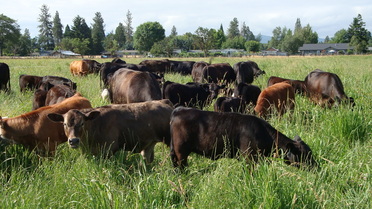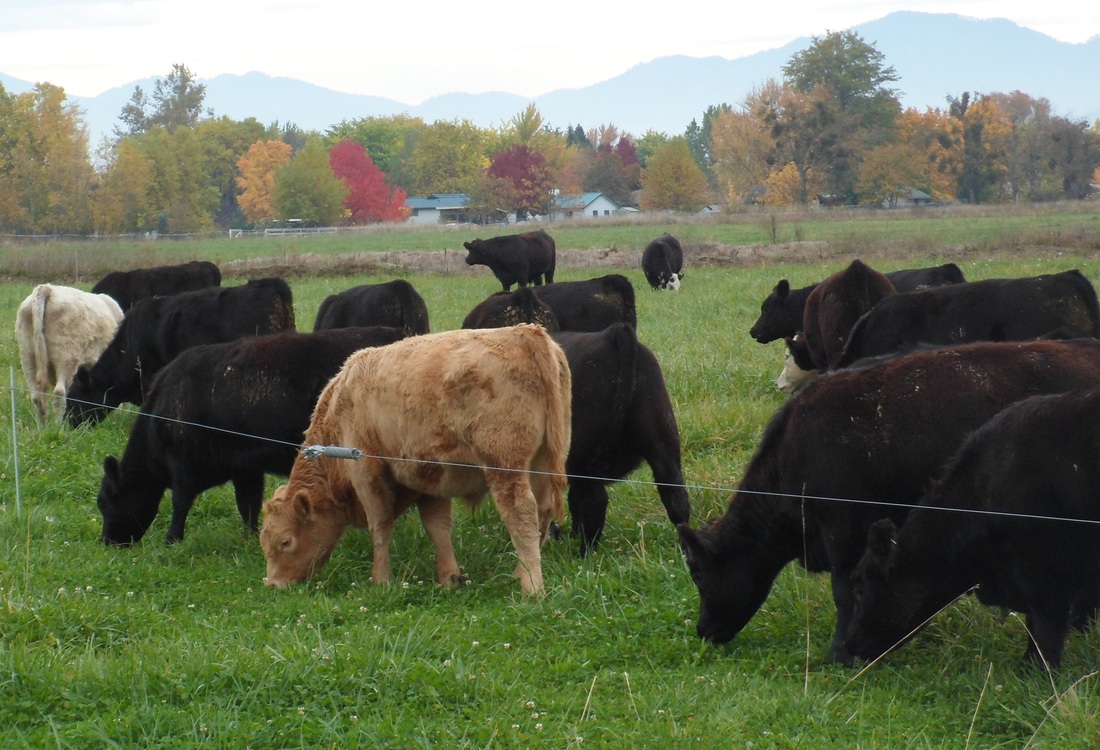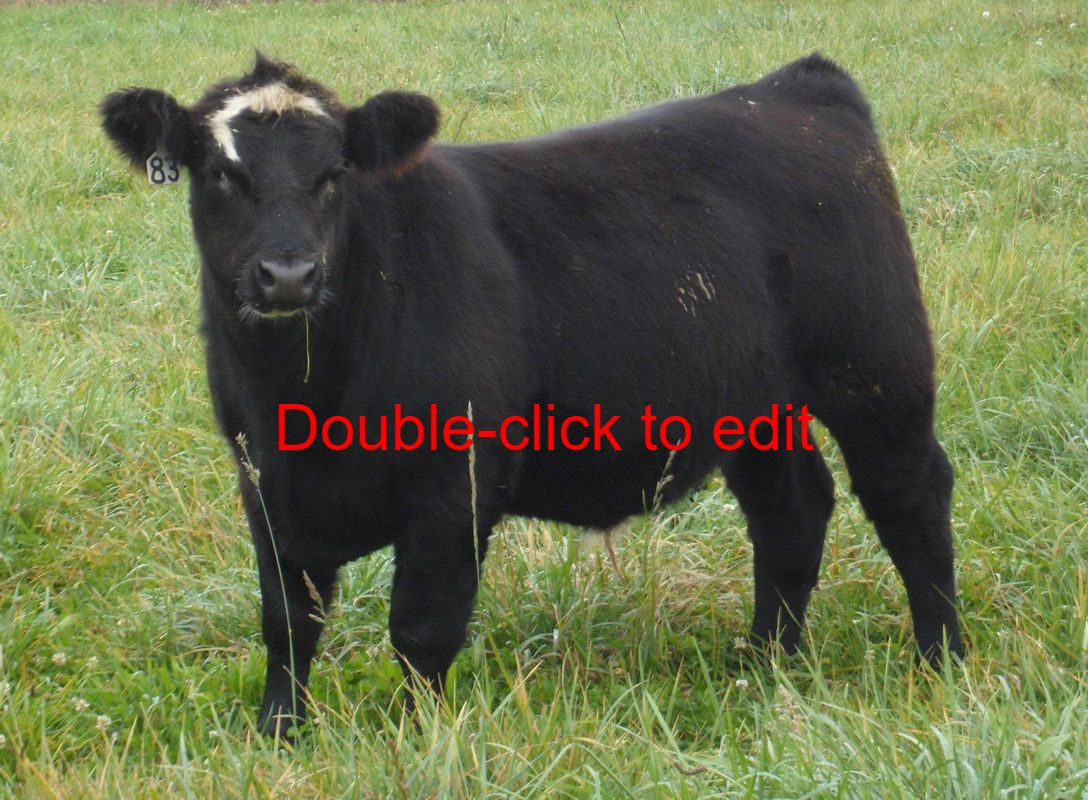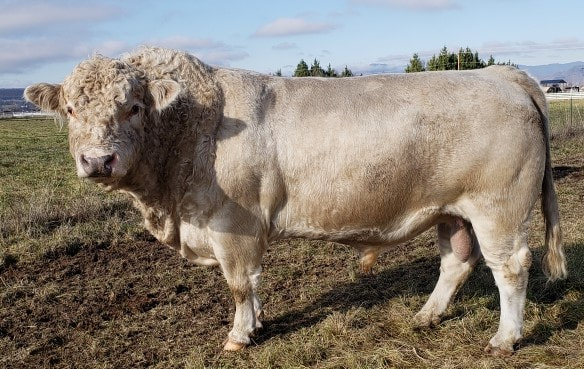
Some of our calves on summer pasture with their dams.
The superior grass-based genetics of our cattle is one of the two elements (the other being our grass) of our operation that sets us apart from our competition. The key to producing tender and tasty grass fed beef is to have our animals well finished (fattened) at a young age. This requires that our cattle gain a minimum of 1.8 pounds of bodyweight per day for their entire life. In recent years, our yearlings have averaged 18 months of age at harvest and yielded carcasses averaging over 700 pounds which converts to a liveweight of about 1200 pounds. Because we select bulls that are well suited to a grass fed program, our yearlings fatten up nicely on grass to produce beef that has sufficient fat to be moist and tender resulting in a pleasurable eating experience.
Most of the beef we sell is produced out of our own cow herd. Our cows are descended from many generations of cattle bred by us during the time we ran beef cows in Missouri and Iowa. For many years, we have utilized artificial insemination as a means to use the best bulls from around the world (including New Zealand). Our cows are predominately Angus based, but we like to use some other English breeds, like Hereford and Red Angus, to maintain some hybrid vigor in our calves. We also used a smaller framed, easy fleshing Charolais bull, White Gold, for several years and one of his home raised sons, Charlie, carried on that bloodline. Charlie and one of his sons are the sires of all of our calves born in 2022 that will be harvested in 2023. Most of our calves are born in March and April and run alongside their mothers until later in the fall when they are weaned. They continue to graze on pastures on through the winter while having their diet supplemented by high quality hay that we have put up during the previous growing season. Then, as spring arrives and forage production increases, the yearlings go back to a full diet of high quality pasture until they are sufficiently finished during the summer and fall.
Because of a decrease in our cow herd due to the loss of some of our pasture ground, we have added about 20 head of purchased calves to our group of raised calves to try to maintain a stable supply of beef to our customers. We are very selective in the choice of calves that we believe meet our standards of quality. We picked calves from two reputable herds in the area. Willow Springs Ranch from our Central Point area and Valley View Beef near Ashland have been raising Angus based cattle for decades and have the kind of cattle that match up well with the genetics in our herd. Dave Westerberg of Valley View Beef has supplied grass finished beef to Standing Stone Brewing Company Restaurant in Ashland in past years. Dave has been doing rotational grazing for many years and several years back hosted a field day with Joel Salatin, a nationally renowned forage-based farmer from Virginia. We have just recently entered into a cooperative agreement with Willow Springs Ranch (Jerry May and Andy Coats) that has us sharing genetics and management skills to prepare for Jerry and Andy to continue on with our grass-finished beef business when Sophia and I retire in next few years.
Most of the beef we sell is produced out of our own cow herd. Our cows are descended from many generations of cattle bred by us during the time we ran beef cows in Missouri and Iowa. For many years, we have utilized artificial insemination as a means to use the best bulls from around the world (including New Zealand). Our cows are predominately Angus based, but we like to use some other English breeds, like Hereford and Red Angus, to maintain some hybrid vigor in our calves. We also used a smaller framed, easy fleshing Charolais bull, White Gold, for several years and one of his home raised sons, Charlie, carried on that bloodline. Charlie and one of his sons are the sires of all of our calves born in 2022 that will be harvested in 2023. Most of our calves are born in March and April and run alongside their mothers until later in the fall when they are weaned. They continue to graze on pastures on through the winter while having their diet supplemented by high quality hay that we have put up during the previous growing season. Then, as spring arrives and forage production increases, the yearlings go back to a full diet of high quality pasture until they are sufficiently finished during the summer and fall.
Because of a decrease in our cow herd due to the loss of some of our pasture ground, we have added about 20 head of purchased calves to our group of raised calves to try to maintain a stable supply of beef to our customers. We are very selective in the choice of calves that we believe meet our standards of quality. We picked calves from two reputable herds in the area. Willow Springs Ranch from our Central Point area and Valley View Beef near Ashland have been raising Angus based cattle for decades and have the kind of cattle that match up well with the genetics in our herd. Dave Westerberg of Valley View Beef has supplied grass finished beef to Standing Stone Brewing Company Restaurant in Ashland in past years. Dave has been doing rotational grazing for many years and several years back hosted a field day with Joel Salatin, a nationally renowned forage-based farmer from Virginia. We have just recently entered into a cooperative agreement with Willow Springs Ranch (Jerry May and Andy Coats) that has us sharing genetics and management skills to prepare for Jerry and Andy to continue on with our grass-finished beef business when Sophia and I retire in next few years.
Charlie, our home raised herd bull sired by White Gold, an ABS Charolais bull, and
out of one of our cows who's granddam is Moon on the maternal side.
out of one of our cows who's granddam is Moon on the maternal side.


